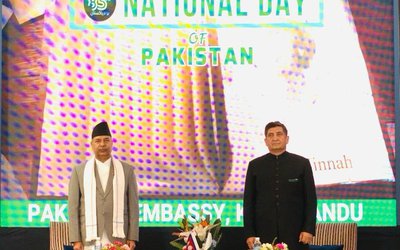Humanitarian aid is a vital aspect of providing relief in the wake of disasters and crises, but the way this aid is delivered has evolved significantly in recent years. One of the most significant changes in humanitarian discourse is the push toward "localization." Underpinned by the Grand Bargain, an agreement forged in 2016 by international humanitarian organizations, donors, and other stakeholders, localization seeks to make humanitarian action more locally driven. The agreement stresses the need for a more effective, inclusive, and sustainable approach to humanitarian aid by empowering local actors, particularly local non-governmental organizations (NGOs), in both response and recovery efforts.
However, the notion of localization remains contentious. While the Grand Bargain explicitly calls for "making principled humanitarian action as local as possible and as international as necessary," the reality on the ground often deviates from these ideals. Despite commitments, international humanitarian agencies, including those working in Nepal, have been criticized for not fully adhering to the principles of localization. This article explores the political dimensions of localization within the context of humanitarian aid in Nepal, highlighting how international organizations, under the guise of localization, may still prioritize political interests over true empowerment of local NGOs. This article tries to explore both the successes and shortcomings of these initiatives, the role of political interests in the process, and how the political landscape in Nepal influences the outcomes of humanitarian response efforts.
Localization refers to the process of shifting decision-making power, funding, and responsibilities from international humanitarian organizations to local actors such as national and local NGOs, civil society organizations, and government bodies. In essence, it aims to ensure that aid is more responsive to the needs of affected communities by enabling local actors to take the lead in both emergency response and long-term recovery.
The Grand Bargain, a landmark agreement signed by more than 50 of major donors, including international humanitarian organizations, sought to address the imbalances in humanitarian aid by committing to on enhancing multi-year investment in local and national responders' capacities for preparedness, response, and coordination, especially in fragile and vulnerable contexts. This includes reducing barriers to partnerships, supporting national coordination mechanisms, and ensuring 25% of humanitarian funding directly reaches local responders by 2020. A "localization" marker will be developed to measure funding to these responders, and funding tools like UN-led Country Based Pooled Fund (CBPF), IFRC Disaster Relief Emergency Fund (DREF), and other NOGs led pooled funds will be utilized to improve assistance delivery.
In 2023, the Grand Bargain developed an implementation agenda with three key priorities: Participation, Localization, and Quality Funding. These priorities were aimed at ensuring greater support for the participation of affected communities, enhancing the leadership and delivery capacity of local responders, and increasing the amount of local funding for humanitarian efforts. The goal was to create more equitable systems where local actors could lead and contribute effectively to humanitarian responses. In 2024, the Grand Bargain introduced 10 levers of transformation, with 25 major actions focused on achieving 10 specific outcomes, one of the most vital being the Localized Funding Caucus, which seeks to ensure that local organizations receive more direct funding and support.
Despite these commitments, challenges persist. Regional NGOs, especially in Nepal, have been working since the 2023 Rukum earthquake response, continue to face obstacles in the optimal utilization of the funds they receive. They are often behind in understanding the endemic issues and the agenda that local communities are facing, which limits their ability to effectively address the needs of those they serve. The implementation of the Grand Bargain's agenda, including localized funding, remains a complex process. While the agreed priorities set an optimistic path for future humanitarian efforts, the actual involvement and empowerment of local actors, including regional NGOs, still requires substantial progress to fully address the barriers that limit their ability to lead and manage responses independently.
Nepal, with its fragile geography, political instability, and recurring natural disasters such as earthquakes and floods, provides a poignant example of the challenges and opportunities surrounding the localization of humanitarian aid. In recent years, several humanitarian agencies have sought to work in partnership with local NGOs in Nepal, delegating authority and financial responsibilities as part of their efforts to localize aid delivery. Despite these efforts, the localization process remains far from straightforward, and political dynamics continue to shape its outcomes.
In the aftermath of the devastating 2015 earthquake in Nepal, the international community mobilized a massive response, with both national and international humanitarian organizations involved in the recovery and rehabilitation efforts. Local NGOs, who had a deep understanding of the affected communities and regions, played a crucial role in responding to the disaster. However, the role of international organizations in the aid response revealed some tensions around localization.
Several international organizations began working with local NGOs in a bid to decentralize decision-making and empower local actors. These collaborations, however, were often limited in scope. For instance, local NGOs were frequently included in the recovery process, but their roles were largely constrained to implementing activities based on pre-determined frameworks set by international organizations. International agencies often controlled the funding flow, decisions around program design, and final evaluations, which limited the autonomy of local NGOs.
One example is the Nepal Red Cross Society (NRCS), a prominent local humanitarian actor that received significant international funding for earthquake response activities. While NRCS played a critical role in the recovery process, much of the funding was channeled through international organizations, which exercised significant influence over how the funds were spent. This top-down approach, while benefiting local NGOs in some cases, hindered the full realization of the Grand Bargain’s goals.
The Grand Bargain: A Promise Undelivered?
The Grand Bargain’s promises of localization were ambitious and noble. It stressed the need for a more decentralized approach, arguing that local organizations often had a better understanding of the needs and capacities of affected communities. However, the reality has been more complicated, and in many instances, international organizations have fallen short of their commitments. Several challenges have prevented the full implementation of the localization agenda in Nepal.
Local NGOs in Nepal frequently encounter political challenges that hinder their full involvement in local humanitarian aid programs. These challenges stem from a complicated political environment, where local authorities, national policies, and international interests often conflict. Local organizations must navigate this maze of competing interests, which can create friction and limit their ability to participate meaningfully. While international agencies claim to support localization by working with regional NGOs, these local partners often have little decision-making power or financial control. International agencies retain significant oversight, citing concerns over accountability and capacity, which undermines the goal of empowering local actors and limiting the influence of external entities.
The control over funding by international donors is another significant barrier to localization. Despite the Grand Bargain’s target of allocating 25% of humanitarian funding to local organizations, this target remains unmet, and local NGOs often rely on international agencies to manage financial resources. This dependency limits local NGOs’ ability to make independent decisions about how funds are allocated and used. International donors also tend to fund organizations that align with their priorities, forcing local NGOs to adopt external agendas. This creates a situation where local organizations may be working within frameworks that are not fully aligned with the actual needs and priorities of the communities they serve, further weakening the principle of localization.
Moreover, international organizations frequently justify their dominance in humanitarian responses by citing the need for capacity building among local NGOs. While enhancing the capabilities of local organizations is important, this rationale can sometimes serve as a means of maintaining control over the response process. By presenting local NGOs as lacking necessary technical and managerial expertise, international agencies can continue to control decision-making and funding allocations. This approach fosters a paternalistic dynamic, where local organizations are treated as passive recipients rather than active participants in the design and delivery of aid, thus hindering true localization efforts.
In Nepal, some local NGOs feel that the focus on capacity building is more about reinforcing the power dynamics between international organizations and local actors than genuinely empowering local communities. Local NGOs often possess valuable cultural knowledge and deep community ties, which are crucial for effective humanitarian work. However, international organizations sometimes downplay these strengths, focusing instead on technical and managerial capacity. This limits the role of local actors in the recovery process, sidelining their expertise and experience, and undermining their ability to contribute meaningfully to the humanitarian response.
In addition to these structural and political challenges, the overall operational environment in Nepal often exacerbates the difficulties faced by local NGOs. The fluctuating political climate, along with varying levels of support from local authorities, complicates the ability of local NGOs to engage effectively in humanitarian work. These obstacles are compounded by frequent changes in national policies and a lack of long-term planning, which disrupts the continuity and sustainability of humanitarian aid efforts. The result is a fragmented approach to aid delivery, where local NGOs struggle to maintain their autonomy and effectiveness in an environment dominated by international organizations and shifting political priorities.
Ultimately, the goal of true localization in Nepal faces significant obstacles from both external and internal factors. Political and bureaucratic challenges, donor control over funding, and the focus on capacity building at the expense of local autonomy all contribute to the limited involvement of local NGOs in decision-making processes. Despite these barriers, there is potential for greater empowerment of local organizations, provided that international agencies are willing to relinquish some of their control and genuinely invest in the capacity and leadership of local actors. Only by addressing these challenges can the principle of localization be fully realized in Nepal’s humanitarian aid landscape.
While the rhetoric of localization espoused by international organizations may appear to prioritize local empowerment, political interests often shape the implementation of localization strategies. In Nepal, political intent frequently underlies the decisions made by international organizations, limiting the effectiveness of localization efforts.
For example, international organizations may be more interested in maintaining their influence over the humanitarian response to protect their funding streams, brand reputation, or political leverage with national governments. In some cases, international organizations may prioritize partnerships with NGOs that align with their political and ideological goals, rather than those with deep local ties or the best understanding of community needs. This can hinder the ability of truly local organizations to take the lead in humanitarian efforts. Programs and partnership components are often managed based on political interests or through intermediaries with narrow and skewed perspectives. These decision-makers typically have limited expertise in DRR and the humanitarian sector, which can result in ineffective or misguided responses that do not adequately address the needs of the affected communities. This lack of in-depth knowledge leads to programs that may not be well-aligned with local realities or the best practices in disaster management.
In Nepal, some local NGOs have critiqued the international community for its limited commitment to true localization, noting that while international organizations speak of empowering local actors, they are often more concerned with maintaining their position as gatekeepers of aid. By preserving decision-making power and financial control, international organizations ensure that they remain central players in the humanitarian system.
Conclusion
Localization in humanitarian aid remains a complex and often contested issue. While the Grand Bargain provides a framework for localizing humanitarian action, the political and operational realities often undermine its objectives. In Nepal, the efforts of international organizations to localize aid have been constrained by political interests, donor dynamics, and bureaucratic obstacles. While some progress has been made in terms of collaboration between international organizations and local NGOs, true empowerment of local actors remains elusive.
In the context of Nepal, the political dimensions of localization are evident. The delegation of financial and decision-making authority to local NGOs has often been superficial, with international agencies retaining control over key aspects of humanitarian response. This political control undermines the spirit of localization, limiting the ability of local NGOs to take the lead in shaping the response and recovery efforts. For localization to succeed, a deeper commitment to shifting power to local actors is required—one that is not just a rhetorical commitment, but a practical reality driven by genuine collaboration and trust.
In conclusion, the political dimensions of localization in humanitarian aid are critical to understanding the successes and failures of these efforts. While the Grand Bargain’s principles offer a hopeful vision for the future of humanitarian aid, the practical implementation of localization remains constrained by political and financial interests. For localization to become a true reflection of the Grand Bargain's promise, international organizations must rethink their roles and empower local actors not just through rhetoric, but through meaningful changes to funding practices, decision-making processes, and the distribution of power. Only then can humanitarian aid become as local as possible and as international as necessary.
Bimal Khatiwada is Oxfam's Technical Coordinator for Disaster Risk Reduction and Resilience in Nepal.
- National Anticipatory Action Framework And Roadmap In Nepal: A Long-Awaited Leap In Nepal’s Disaster Risk Management
- Apr 15, 2025
- Localization: A Path To Socio-Economic Transformation In The Globalized World
- Mar 24, 2025
- Sustainability In Development Projects: An Appraisal Of Nepal's Development Landscape
- Jan 19, 2025
- Saga of the Justice Reality: Work from Home with Remote Allowance
- Dec 05, 2024
- Climate Justice: A Global Call For Gender Equity In The Age Of Climate Change
- Nov 10, 2024














